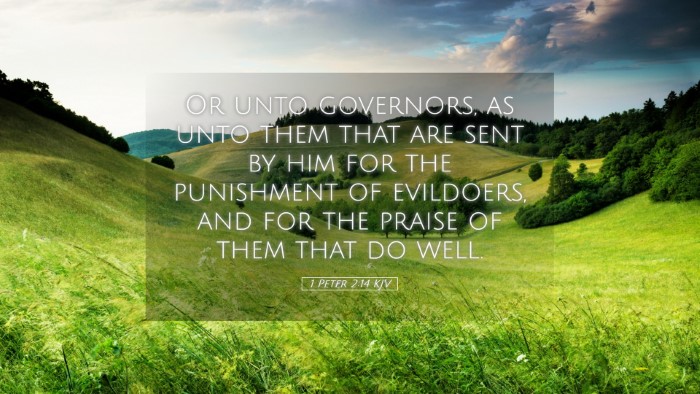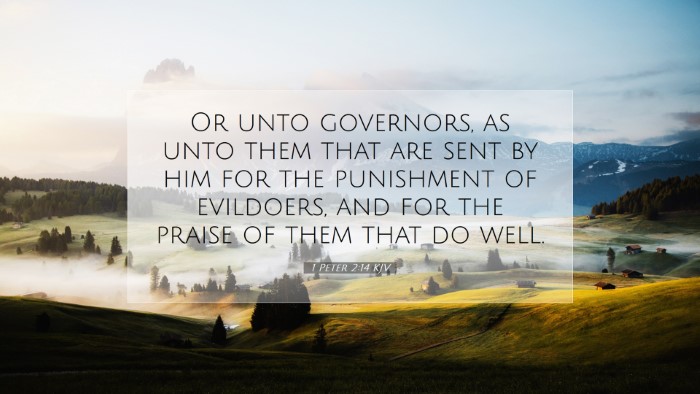Commentary on 1 Peter 2:14
Bible Verse: "Or unto governors, as unto them that are sent by him for the punishment of evildoers, and for the praise of them that do well."
Introduction
The verse selected from 1 Peter 2:14 addresses the relationship between Christians and secular authorities. It emphasizes the divine order of governance, as well as the responsibility of believers towards such authorities. This commentary aims to unpack the text by drawing insights from public domain commentaries, providing a meaningful exploration for pastors, students, and scholars.
Contextual Background
In the broader context of 1 Peter, the apostle addresses Christians who are facing persecution and suffering. Peter provides encouragement for believers to uphold their faith while engaging with a hostile societal structure. This epistle emphasizes the need for submission to authority as part of living a Christian life.
The Nature of Authority
As noted by Matthew Henry, authority is established by God, reflecting His order. The term "governors" refers to those in positions of power appointed to maintain peace and justice. Understanding authority in this light invites believers to see their submission not merely as obedience to human rules but as honoring God’s ordained structure.
Roles of Governors
Albert Barnes provides a penetrating look into the functions of governors: they are primarily charged with the punishment of evildoers and rewarding those who do good. This dual role illustrates God's intent for good governance, where civil authorities are employed to nurture a society that reflects justice.
Submission for the Lord's Sake
Peter employs the phrase, "as unto them that are sent by him," highlighting that submission to governing authorities is ultimately a submission to God's will. Adam Clarke elaborates on this by suggesting that Christian submission should be motivated by love for God and a desire to foster His peace within society. This reinforces that our allegiance to Christ doesn't negate our duty to the state.
Theological Implications
This verse poses critical theological reflections regarding the Christian's engagement with government. The call to submit to authorities holds significant implications for both ecclesiology and ethics.
Ecclesiological Considerations
The implication of this text for the Church is profound. It reminds Christians that the Church, while distinct, operates within the societal framework. Matthew Henry notes that while we are citizens of heaven, we still live in the earthly realm, thereby calling for a balance between spiritual and civic responsibilities.
Ethical Responsibilities
Ethically speaking, this command influences how Christians interact with laws and governance. Barnes remarks that adherence to civil laws reflects one’s commitment to divine commands. Therefore, believers are encouraged to act justly, demonstrating integrity in their societal interactions, which can serve as a testimony of their faith.
Practical Applications
Moving from theology to practice, this verse provides vital direction for Christians living in secular contexts:
- Respect for Authority: As noted by Clarke, exhibiting honor towards those in authority establishes a witness of Christian character within the community.
- Civic Engagement: Participation in societal matters is essential. Being informed and involved allows Christians to contribute positively to the welfare of society.
- Prayer for Leaders: Believers are called to pray for those in authority. Such prayers recognize that rulers are ultimately stewards of God’s will.
Conclusion
In summary, 1 Peter 2:14 invites profound reflection on the believer's stance toward earthly authorities. Through submission, respect, and active citizenship, Christians can fulfill a mandate that not only honors God but also promotes justice and order in society. The insights from Matthew Henry, Albert Barnes, and Adam Clarke unify to provide an enriching understanding of this text, motivating believers to both acknowledge divine authority and faithfully navigate their roles in the world.


